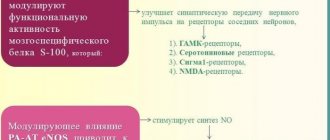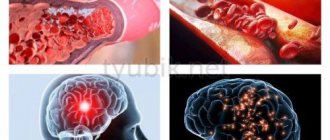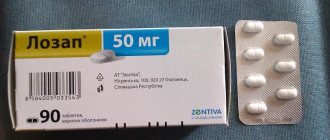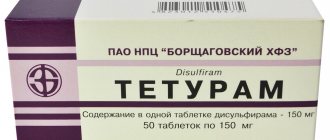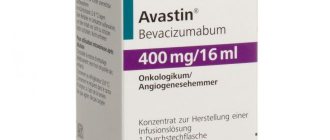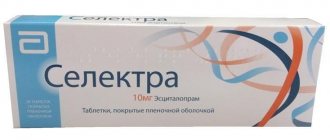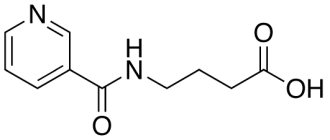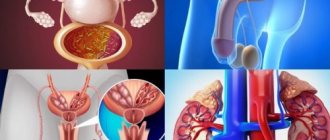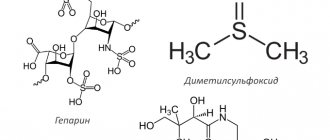Meniere's syndrome and some other diseases accompanied by hearing loss and the development of attacks of tinnitus, as well as periodic attacks of severe dizziness, require the use of specialized medications. One of the medications that can be prescribed is Betagistin.
Betahistine is a drug that has a positive effect on microcirculation in the labyrinth of the inner ear and is used for dysfunction of the vestibular apparatus and for the treatment of dizziness of various etiologies. The medication has a histamine-like effect and improves microcirculation. The drug is effective when administered orally.
The active substance betahistine, which is available in the form of dihydrochloride, is a synthetic analogue of histamine.
Betahistine has an active effect on blood flow in the human body, helping to stimulate microscopic circulation and leakage of capillaries in the inner ear. The active ingredient of the drug improves microcirculation and permeability of the capillaries of the inner ear, and also normalizes endolymph pressure in the labyrinth and cochlea.
The drug "Betagestin" for dizziness is prescribed to patients very often. In addition, the drug is used to treat Meniere's syndrome, as well as to eliminate tinnitus, nausea, partial hearing loss and impaired coordination.
In addition, Betahistine can improve blood supply to the entire central nervous system, due to the partial expansion of a special vascular formation - the basilar artery. As a result, mental abilities are normalized, memory, cognitive capabilities, and so on return to normal.
When taken correctly, the medication can quickly eliminate the signs of vestibular vertigo. The exposure time of the active component ranges from several minutes to one day.
The active ingredient of Betahistine tablets is capable of engaging histamine H-3 and H-1 receptors (strong and weak antagonists) of the central nervous system (that is, receptors of the vestibular nuclei and inner ear). Studies have found that the drug improves cerebral blood flow and has a vasodilating effect.
Composition: 1 tablet contains betahistine dihydrochloride in terms of 100% substance 8 mg, 16 mg or 24 mg.
Thanks to taking the drug, the following positive dynamics are observed:
– reduction in the intensity and frequency of dizziness, – improvement in hearing, – reduction in the level of tinnitus, – general positive effect on the vestibular system, – activation of recovery processes in the central nervous system.
Forms of release and composition of the drug Betahistine
The drug is available in tablet form (8, 16, 24 mg) and in the form of drops (100 ml contains 1.25 g of the drug, 30 ml in a bottle).
In addition to the active substance, the drug contains the following auxiliary components:
- magnesium stearate - binder (anti-adhesive) substance;
- colloidal silicon dioxide (Aerosil) - gives the tablets a sliding property;
- microcrystalline cellulose - allows you to press the medicinal mixture;
- lactose - improves the flowability of the tablet mass;
- crospovidone - promotes better dissolution of tablets.
Additional ingredients are absolutely harmless:
- do not suppress brain activity;
- do not affect the speed of reactions;
- do not cause drowsiness.
Betagistine
Currently, pharmacists are working on creating a long-acting drug Betahistine. Scientists plan to release a tablet form in a dosage of 48 mg with the release of the active substance within 12 hours.
This will reduce the frequency of taking the medication. With a long course of treatment, this approach will protect patients from side effects.
What happens after taking the drug
After oral administration, Betahistine is quickly and completely absorbed into the gastrointestinal tract.
Maximum concentration in the blood: recorded within 1-3 hours after administration on an empty stomach.
Blood protein binding: less than 5%.
Bioavailability of the drug: 97-99%.
Half-life: 10-12 hours.
Almost completely excreted by the kidneys in the form of 2-pyridylacetic acid (together with urine - more than 90% of the active substance), throughout the day.
Pharmacodynamics and pharmacokinetics
Pharmacodynamics
The drug strengthens the H1 receptors of the vessels of the inner ear, and at the same time weakens the H3 receptors of the vestibular nuclei of the central nervous system.
This coordinated effect leads to:
- improving microcirculation and penetration of necessary substances into the capillaries;
- normalization of endolymph pressure in the labyrinth and cochlea;
- increased blood flow in the basilar artery;
- increased conductivity in neurons of the vestibular nuclei of the brain stem.
This affects the patient's well-being:
- instability of coordination manifests itself less frequently and less intensely;
- Noisy sensations in the ears are reduced;
- hearing capabilities increase.
Pharmacokinetics
When ingested, the drug dissolves easily in water. Betahistine hydrochloride is immediately released and absorbed in all parts of the gastrointestinal tract. This process slows down if you swallow the pills with food, but this does not change the effectiveness.
The substance accumulates maximum within 3 hours. Under the influence of metabolic reactions, Betahistine breaks down and 2-peridylacetic acid is formed, which leaves the body in the urine within 24 hours.
pharmachologic effect
Betahistine belongs to the group of histamine analogues. Histamine regulates many physiological processes and is obtained synthetically. The effect of the drug betahistine is similar to that of this organic compound. It acts on histamine receptors.
Betahistine has a positive effect on improving microcirculation in the labyrinth and regulates blood pressure. The substance helps with dizziness of various etiologies. In addition, the product helps improve hearing and helps restore the functions of the inner ear after surgical interventions. The drug also has a beneficial effect on improving the smooth muscles of the bronchi and gastrointestinal tract.
The medicine can improve blood supply to the entire nervous system due to the partial expansion of the basilar artery. This leads to the patient's improvement in:
- mental capacity;
- cognitive abilities;
- memory.
Indications for use
Betahistine is a synthetically produced substance similar to histamine. In 1970, it was registered in Europe for the treatment of Meniere's disease (a disease of the inner ear).
It is characterized by the following symptoms:
- attacks of deafness (each subsequent manifestation aggravates hearing problems);
- noise in ears;
- dizziness;
- imbalance;
- autonomic disorders.
Betahistine (reviews from patients who took the drug confirm its effectiveness) is also prescribed when diagnosed:
- vestibular neuritis;
- labyrinthitis;
- weakening of blood flow in the arteries;
- development of encephalopathy after severe injury;
- atherosclerosis.
The drug expands the source of blood vessels in the inner ear, improves blood movement.
Contraindications
Treatment with Betahistine is contraindicated in:
- pheochromocytoma (tumor of chromaffin cells in the adrenal glands);
- exacerbation of ulcerative lesions of the stomach and duodenum;
- carrying a child (possibly in urgent need);
- breastfeeding;
- bronchial asthma;
- allergic reactions to the components of the drug;
- lactose intolerance;
- Lactose deficiency or galactose malabsorption.
Instructions for use, dosage of the drug
When treated with Betahistine, patients need to be prepared to take the drug for a long time, but a decrease in symptoms occurs already at the beginning of therapy. The best results are felt after 2-3 months. To avoid deterioration or loss of hearing, it is necessary to start taking the medicine as soon as possible.
Treatment regimens are as follows:
- 8 mg - 1-2 tablets. three times a day;
- 16 mg - ½-1 tablet. 3 times;
- 24 mg - 1 tablet. in 2 doses.
The dosage is selected by the doctor, who takes into account the disease and condition of the patient. Do not exceed 48 mg of medication per day.
For dizziness
During dizziness, a person feels movement that is not actually happening (false). This symptom occurs due to problems in the inner ear. It is this organ that is responsible for balance in the body. The use of Betagistine helps to cope with dizziness of any origin (peripheral, central).
Processes occurring in the vestibular apparatus cause dizziness and nausea. The cause of violations is only external factors, and not the disease of the device itself
As a result:
- microcirculation in the basilar basin is improved;
- the movement of endolymph in the inner ear is restored;
- the function of nerve cells is activated;
- interneuron conduction improves.
Treatment tactics involve taking Betahistine three times (8 and 16 mg) or twice (24 mg) per day, which continues until a positive result is achieved.
For hearing loss
A decrease in auditory perception that appears due to damage to any part of the sound-receiving section of the auditory analyzer is called hearing loss.
The cause of the pathology is factors such as:
- diseases of the middle ear of an acute and chronic nature;
- acute infectious lesions;
- use of drugs that affect hearing;
- severe emotional shock;
- work related to noise and vibrations.
If hearing loss is not treated, the process begins to progress. The end result is hearing loss.
To stop the development of pathology, use the following steps:
- exclude provoking factors;
- use medications that restore microcirculation in the inner ear;
- start treatment as early as possible.
Betahistine is prescribed for a period of at least 3 months. The frequency of administration depends on the dose of the drug: 8 and 16 mg 3 times a day, 24 mg - 2 doses.
For noise in the ear
Noise in the ear is one of the symptoms characteristic of the development of hearing loss. It is a manifestation of pathological changes in any part of the auditory analyzer. Therefore, taking Betahistine according to the regimen prescribed for the treatment of a hearing problem, the patient simultaneously solves two problems. It is important to start treatment at the initial stage of the disease
For cervical osteochondrosis
The cause of dizziness in cervical osteochondrosis is a violation of blood flow in the vertebrobasilar system, which is formed from the arteries of the spine. It supplies blood to the posterior parts of the brain. This condition can also occur in young patients.
Betahistine changes the situation for the better. As a result of treatment, vestibular compensation occurs. Typically, the doctor uses the following prescription: take 24 mg of the drug twice a day for 3 months.
For headaches
In chronic cerebrovascular insufficiency (CCF), diseases develop in the vestibular regions, the main symptoms of which are pain in the head and loss of balance:
- vegetative-vascular paroxysms;
- vascular disorders (hypertension);
- atherosclerosis.
In patients with CNMK, the condition gradually worsens (from the first to the fourth stage).
During treatment the following drugs are prescribed:
- hypotensive;
- anti-sclerotic;
- improving cerebral blood flow;
- normalizing blood fluidity.
Betahistine has a complex effect, which improves blood supply to the brain and increases blood flow in the inner ear. Prescription of the drug: 24-48 mg per day in 2-3 doses until a positive result is obtained.
Mode of application
The drug is taken orally, without chewing, during or after meals, with a sufficient amount of water.
Recommended starting dosage: 24 – 48 mg betahistine dihydrochloride per day. The specified amount is divided into 2-3 servings, which are taken throughout the day.
The course can be quite long (from several weeks to several months), since the therapeutic effect can increase with prolonged treatment.
The first improvements in the condition may be noticeable already on the 2nd day of treatment.
The duration of taking the drug is determined individually.
Side effects
Betahistine (reviews from patients who took the drug indicate its good tolerability) in rare cases has a negative effect on the gastrointestinal tract.
This is expressed by the following symptoms:
- nausea;
- discomfort in the upper abdomen;
- bowel dysfunction;
- formation of gases.
Unpleasant sensations do not occur if Betahistine is taken with food.
Patients with sensitive skin may:
- rashes;
- itchy sensations;
- pale pink blisters (urticaria).
If you are hypersensitive to any component of the drug, swelling of the mucous membrane may begin.
Overdose
Clinical studies on volunteers revealed several cases of overdose after taking up to 640 mg of the drug per day.
The patients' condition was mild or moderate, which was expressed by the following symptoms:
- nausea;
- desire to lie down and sleep;
- abdominal pain.
When intentionally taking high doses of the drug, the following occur:
- convulsions;
- heart problems;
- pulmonary complications.
To get rid of intoxication, proceed as follows:
- wash the stomach;
- sorbents are prescribed (activated carbon, Enterosgel);
- use vitamins;
- restore microflora (preparations with bifidobacteria and lactobacilli, yogurt);
- cleanse the liver and kidneys.
Vacation conditions and price
Anti-dizziness tablets betahistine, the price of which usually depends on the region, are in demand. The price depends on how many pieces are in the package, whether the manufacturer is imported or Russian. Betahistine 24 mg in Russia is quite cheap, up to 65 rubles. For many buyers, such a low price is an advantage of the drug. But the price also depends on the country of origin, varies on the raw materials used and the number of tablets in the package. Thus, the cost of the medicine can reach 1114 rubles.
The price varies depending on the city. In St. Petersburg it starts from 23 rubles, in Moscow it is a little more expensive, in Nizhny Novgorod, Minsk, Krasnoyarsk from 50 rubles. In Rostov and Lipetsk the price may also vary. Tablets can be found for both 40 and 70 rubles.
special instructions
Betahistine (reviews from patients who took the drug warn of possible complications) has not been sufficiently studied, so taking the tablets is under the supervision of a doctor in the following cases:
- during pregnancy - treatment is possible if the potential threat to the mother outweighs the harm to the child;
- during breastfeeding - it is unknown whether the active substance passes into mother's milk or not;
- in the presence of a gastrointestinal ulcer in the medical history.
Betahistine does not cause a hypnotic effect, therefore it does not affect driving or other mechanisms. During therapy, it is necessary to refrain from drinking alcoholic beverages to avoid unexpected individual reactions.
No dosage adjustment of the drug is required:
- elderly patients;
- with renal failure;
- for liver problems.
Analogs
The following medicines also contain betahistine hydrochloride:
| Drug name | Manufacturer country | price, rub. |
| Vertran | Croatia | 267 |
| Betaserk | USA | 415 |
| Vestibo | Germany | 161 |
| Tagista | Serbia | 89 |
| Betaver | Russia | 239 |
| Westicap | Russia | 319 |
The action of these drugs is similar to Betagistine. Patients have a choice between domestic and foreign drugs.
Betahistine analogues, list of drugs
- Avertid;
- Aviomarine;
- Betanorm;
- Betaserc;
- Verisin;
- Vestibo;
- Dramamine;
- Maxhistin;
- Neurogin;
- Stugeron;
- Cinnaridone;
- Cinnarizine.
It is important to understand that the instructions for use of Betahistine, price and reviews do not apply to analogues and should not be used as a guide for use. All therapeutic actions, including replacing Betahistine with an analogue, must be carried out by a qualified specialist. The information is provided for informational purposes only. These instructions for use should not be used as a guide to self-medication. The need for prescription, methods and doses of the drug are determined exclusively by the attending physician.
Terms, conditions of sale and storage
According to reviews from patients who have taken the drug, Betahistine is dispensed in pharmacies only after providing a prescription. This suggests that for diseases susceptible to Betahistine, self-medication is unacceptable.
The instructions for the drug say that Betahistine must be stored in a dry place, protected from the sun. The room temperature must be maintained between 18 and 25 degrees. At home, keep the tablets away from children and animals.
The drug remains suitable for 2 years. Some manufacturers increase the period (from 3 to 5 years). It is unacceptable to use expired medicine, even if the expired period is insignificant.
Reviews from patients and doctors
Reviews from doctors and patients are mostly positive :
- Patient Taya: “I don’t know what happened in my body after giving birth, but I had severe dizziness every day. The doctors said that fatigue was to blame. At my own risk, I bought the drug that was the first to come across in the pharmacy (with the necessary pharmacology and indications). These were Betahistine tablets. At first I took 2 tablets a day. Then I reduced the dose to one. The drug helps very well. There were no side effects - I guess I was lucky.”
- Patient Nadezhda: “After the onset of menopause, I began to experience sudden dizziness, due to which I experienced great discomfort. I could barely get out of bed in the morning. I’ve been taking Betahistine for about the 5th week now, the improvements are noticeable: I have more strength, fewer attacks, but sometimes I experience heartburn. There is a suspicion that this is a side effect."
- Patient Oksana: “I have big problems with the vestibular system: even if I just look at fast-moving objects, I immediately start feeling sick and dizzy. The doctor prescribed Betahistine for me. After the first day of taking it, I had severe diarrhea, so I reduced the dose. I have been taking the drug for 3 weeks now. I feel like my head is spinning much less often, and I’ve stopped feeling nauseous altogether.”
- Patient Artem: “The dizziness went away, but the headaches started. Now I also have to take medicine for headaches.”
- Dr. Veniamin Petrovich: “In general, the drug has a very positive effect on dizziness of various etiologies. This product is characterized by excellent value for money. Despite all its effectiveness, the number of side effects and recorded negative manifestations in practice is minimal.”
- Dr. Vladimir: “We successfully prescribe it to patients who have suffered brain injuries and neurosurgical operations.”
Advice from patients:
- reduce the dosage if problems with the gastrointestinal tract arise;
- If there is no result within several weeks, discontinue the drug.
Positive and negative characteristics
Pros:
- pleasant, affordable price;
- a small number of possible side effects;
- variety of proposed concentrations of the active substance (release forms);
- relieves dizziness and coordination problems well;
- in general, quite a positive experience in practical application.
Minuses:
- sometimes heartburn and headaches are possible;
- the drug does not have the desired effect on all patients;
- remissions of dizziness are possible;
- low bioavailability in comparison with analogue drugs.
Find out from our material whether amyotrophic lateral sclerosis can be cured and how to alleviate the patient’s condition. Treatment of stroke with pine cones will be effective only if you follow a clear recipe and rules for taking the medicine.
Price in pharmacies in Moscow, St. Petersburg, regions
Today, pharmacies offer a large selection of Betagistine and its analogues.
Prices for the drug vary greatly, and are directly dependent on:
- manufacturer;
- drug dosage;
- number of pills in the package.
Patients have the opportunity to purchase the medicine at a pharmacy located within walking distance or order online. The second option is more profitable due to lower prices.
The availability of the drug can be found out and ordered in the following online pharmacies in Moscow:
- Eapteka-ru.
- Piluli-ru.
- Apteka-ru.
- Zdravciti-ru.
- Risnet-ru.
This product is presented by the following pharmaceutical companies:
- Vertex;
- Canonpharma;
- North Star;
- Pranapharm;
- Medisorb;
- OZONE LLC.
Manufacturers supply Betahistine in any dosage. The price varies from 91 to 556 rubles.
The most affordable prices are offered by pharmacists Pranapharm and OZON LLC (from 56 to 156 rubles). And the Vertex company produces the most expensive versions of Betagistin, starting from 153 rubles.
In pharmacies in St. Petersburg, prices for Russian-made Betagistine are slightly different:
- 8 mg, 30 tab. — from 13.80 to 89 rub.
- 16 mg, 30 tab. — from 67 to 89 rub.
- 24 mg, 20 tab. — from 61.70 to 77 rub.
- 24 mg, 30 tab. — from 71 to 89 rub.
The drug can be purchased at low prices in the following pharmacies:
- Pharmacy No. 186 - 2nd line, 51, Kingisepp.
- PetroPharmacy - Kamennoostrovsky pr., 42; DK im. Lensoveta, 2nd floor.
- Sita-Farm - 8th Sovetskaya, 41A.
The lowest prices for the drug in the following pharmacies:
- Vita-Express - Ispytatelev Ave., 6, bldg. 1; st. Yesenina, 32, bldg. 1; Novocherkassky Ave., 43/17A.
- Pharmacy for the thrifty - Sredny pr., 46.
- Pharmacy on Marata - st. Marata, 41.
- Pharmacy on Marata - st. Marata, 41.
- Homeopathic pharmacy - Bolshoy pr-t, P.S., no. 2.
- Care - Zagreb blvd., 9.
- Rigla - Bolshoi Sampsonievsky Ave., 55.
- Available pharmacy - Kosygina Ave., 27, bldg. 1.
- Pulse - Moskovsky Ave., 2/6.
An analysis of prices for Betagistine in various regions of Russia showed that they differ slightly even in cities remote from the capital.
In pharmacies in Saratov, Rostov-on-Don, Nizhny Novgorod, Kemerovo, the drug is available in all available dosages (8, 16, 24 mg). The pills, which according to the prescription must be taken three times a day, are packaged in 30 pieces. Tablets with the highest content of active ingredient (24 mg) can be purchased in quantities of 20, 30 and 60 pieces.
Prices for the drug fluctuate (in rubles):
- 8, 30 - from 71 to 116;
- 16, 30 - from 81.10 to 286;
- 24, 20 - from 71.90 to 336;
- 24, 30 - from 88 to 336;
- 24, 60 - from 163 to 603.
The therapeutic effect of taking Betahistine is achieved if the patient trusts the specialist and strictly follows the prescribed recommendations. Reviews from patients who took the drug fully confirm this.
Article design: Vladimir the Great
Betagistine
Active substance:
Betahistine*
Pharmgroup:
Angioprotectors and microcirculation correctors
Average price in pharmacies
| Name | Manufacturer | average price |
| Betahistine 0.008 n30 tablet /ozone/ | OZONE, LLC | 108.00 |
| Betahistine 0.008 n30 tablet /pranapharm/ | Pranapharm, LLC | 97.00 |
| Betahistine 0.016 n30 tablet /pranapharm/ | Pranapharm, LLC | 101.00 |
| Betahistine 0.024 n 20 tablets /pranapharm/ | Pranapharm, LLC | 101.00 |
| Betahistine 0.024 n30 tablet /Obolenskoye/ | OBOLENSKOYE | 280.00 |
Analogs for the active substance:Asniton Betaver Betahistine hydrochloride Betahistine dihydrochloride Betaserk Betacentrin Vazoserk Vestibo Westicap Denoise Microzer Tagista | Application area:Meniere's disease/syndrome Vertigo Vestibular disorder Vestibular nystagmus Sudden deafness Dizziness Dizziness and nausea while traveling by transport Idiopathic tinnitus Ischemic hearing and balance impairment Ischemic hearing and balance impairment Ischemic hearing and balance impairment Cochleo-vestibular disorder of ischemic nature Cochleovestibular disorder Cochleovestibular disorder Cochleovestibular syndrome of vascular origin Labyrinthine dropsy Labyrinthine-vestibular disorders Labyrinthine disorders Meniere's disease Disturbance of microcirculation in the labyrinth Hearing impairment Hearing impairment of vascular origin Balance disorders Hearing impairment Uncontrollable vomiting Repeated vomiting Hearing loss Postoperative vomiting Postoperative nausea Balance disorders Vomit Vomiting in the postoperative period Medicinal vomiting Vomiting due to radiation therapy Vomiting due to cytostatic chemotherapy Vomiting uncontrollable Vomiting during radiation therapy Vomiting during chemotherapy Vomiting of central origin Meniere's syndrome Hearing loss Age-related hearing loss Persistent hiccups Persistent vomiting Nausea The phenomenon of accelerated rise in volume (FAG) Noise in ears Endolymphatic hydrops |
